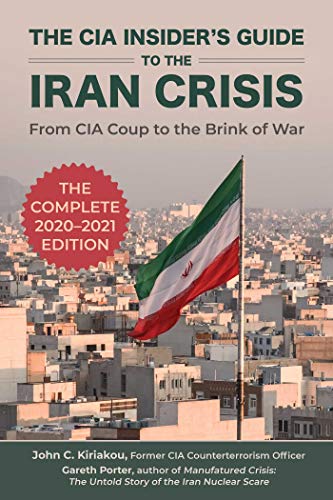An investigation of supposed Iranian nuclear documents presented in a dramatically staged Netanyahu press conference indicates they were an Israeli fabrication designed to trigger US military conflict with Iran.
President Donald Trump scrapped the nuclear deal with Iran and continued to risk war with Iran based on Israeli Prime Minister Benjamin Netanyahu’s claim to have proven definitively that Iran was determined to manufacture nuclear weapons. Netanyahu not only spun Trump but much of the corporate media as well, duping them with the public unveiling of what he claimed was the entire secret Iranian “nuclear archive.”
 Manufactured Crisis: T...
Best Price: $19.91
Buy New $27.99
(as of 09:35 UTC - Details)
In early April 2018, Netanyahu briefed Trump privately on the supposed Iranian nuclear archive and secured his promise to leave the Joint Comprehensive Plan of Action (JCPOA). That April 30, Netanyahu took the briefing to the public in a characteristically dramatic live performance in which he claimed Israel’s Mossad intelligence services had stolen Iran’s entire nuclear archive from Tehran. “You may well know that Iran’s leaders repeatedly deny ever pursuing nuclear weapons…” Netanyahu declared. “Well, tonight, I’m here to tell you one thing: Iran lied. Big time.”
Manufactured Crisis: T...
Best Price: $19.91
Buy New $27.99
(as of 09:35 UTC - Details)
In early April 2018, Netanyahu briefed Trump privately on the supposed Iranian nuclear archive and secured his promise to leave the Joint Comprehensive Plan of Action (JCPOA). That April 30, Netanyahu took the briefing to the public in a characteristically dramatic live performance in which he claimed Israel’s Mossad intelligence services had stolen Iran’s entire nuclear archive from Tehran. “You may well know that Iran’s leaders repeatedly deny ever pursuing nuclear weapons…” Netanyahu declared. “Well, tonight, I’m here to tell you one thing: Iran lied. Big time.”
However, an investigation of the supposed Iranian nuclear documents by The Grayzone reveals them to be the product of an Israeli disinformation operation that helped trigger the most serious threat of war since the conflict with Iran began nearly four decades ago. This investigation found multiple indications that the story of Mossad’s heist of 50,000 pages of secret nuclear files from Tehran was very likely an elaborate fiction and that the documents were fabricated by the Mossad itself.
 Cbrn: Surviving Chemic...
Best Price: $46.65
Buy New $35.00
(as of 04:39 UTC - Details)
According to the official Israeli version of events, the Iranians had gathered the nuclear documents from various locations and moved them to what Netanyahu himself described as “a dilapidated warehouse” in southern Tehran. Even assuming that Iran had secret documents demonstrating the development of nuclear weapons, the claim that top secret documents would be held in a nondescript and unguarded warehouse in Central Tehran is so unlikely that it should have raised immediate alarm bells about the story’s legitimacy.
Cbrn: Surviving Chemic...
Best Price: $46.65
Buy New $35.00
(as of 04:39 UTC - Details)
According to the official Israeli version of events, the Iranians had gathered the nuclear documents from various locations and moved them to what Netanyahu himself described as “a dilapidated warehouse” in southern Tehran. Even assuming that Iran had secret documents demonstrating the development of nuclear weapons, the claim that top secret documents would be held in a nondescript and unguarded warehouse in Central Tehran is so unlikely that it should have raised immediate alarm bells about the story’s legitimacy.
Even more problematic was the claim by a Mossad official to Israeli journalist Ronen Bergman that Mossad knew not only in what warehouse its commandos would find the documents but precisely which safes to break into with a blowtorch. The official told Bergman the Mossad team had been guided by an intelligence asset to the few safes in the warehouse contained the binders with the most important documents. Netanyahu bragged publicly that “very few” Iranians knew the location of the archive; the Mossad official told Bergman “only a handful of people” knew.
But two former senior CIA official, both of whom had served as the agency’s top Middle East analyst, dismissed Netanyahu’s claims as lacking credibility in responses to a query from The Grayzone.
 The CIA Insideru2019s ...
Buy New $14.99
(as of 10:55 UTC - Details)
According to Paul Pillar, who was National Intelligence Officer for the region from 2001 to 2005, “Any source on the inside of the Iranian national security apparatus would be extremely valuable in Israeli eyes, and Israeli deliberations about the handling of that source’s information presumably would be biased in favor long-term protection of the source.” The Israeli story of how its spies located the documents “does seem fishy,” Pillar said, especially considering Israel’s obvious effort to derive maximum “political-diplomatic mileage” out of the “supposed revelation” of such a well-placed source.
The CIA Insideru2019s ...
Buy New $14.99
(as of 10:55 UTC - Details)
According to Paul Pillar, who was National Intelligence Officer for the region from 2001 to 2005, “Any source on the inside of the Iranian national security apparatus would be extremely valuable in Israeli eyes, and Israeli deliberations about the handling of that source’s information presumably would be biased in favor long-term protection of the source.” The Israeli story of how its spies located the documents “does seem fishy,” Pillar said, especially considering Israel’s obvious effort to derive maximum “political-diplomatic mileage” out of the “supposed revelation” of such a well-placed source.
Graham Fuller, a 27-year veteran of the CIA who served as National Intelligence Officer for the Near East and South Asia as well as Vice-Chairman of the National Intelligence Council, offered a similar assessment of the Israeli claim. “If the Israelis had such a sensitive source in Tehran,” Fuller commented, “they would not want to risk him.” Fuller concluded that the Israelis’ claim that they had accurate knowledge of which safes to crack is “dubious, and the whole thing may be somewhat fabricated.”




